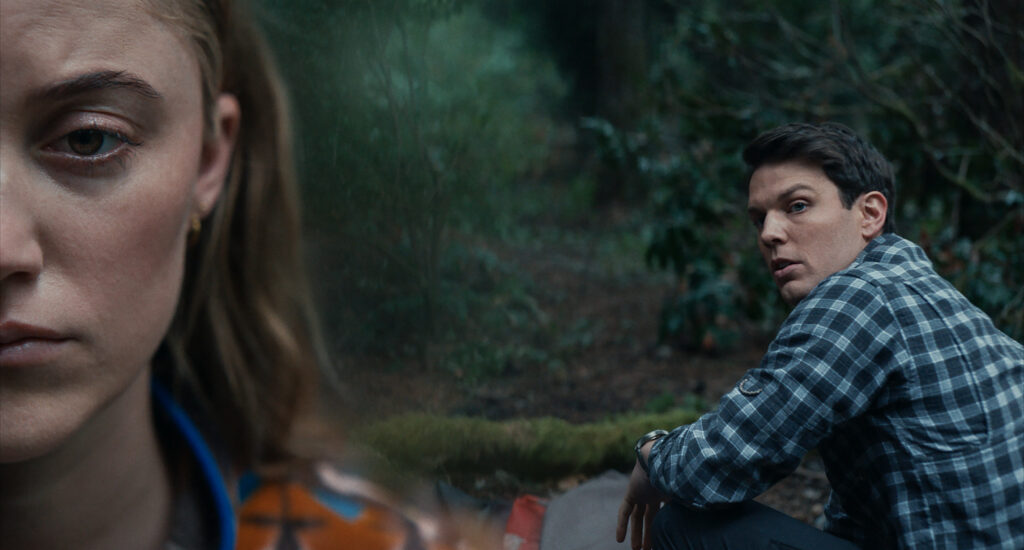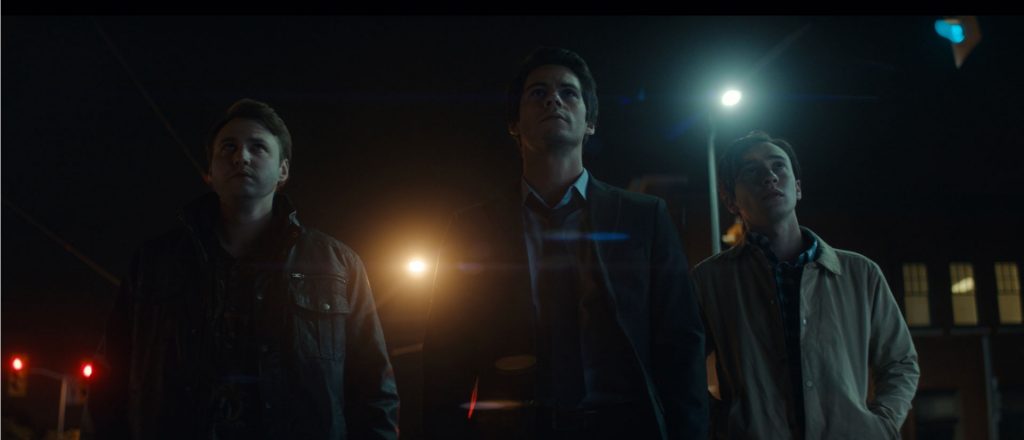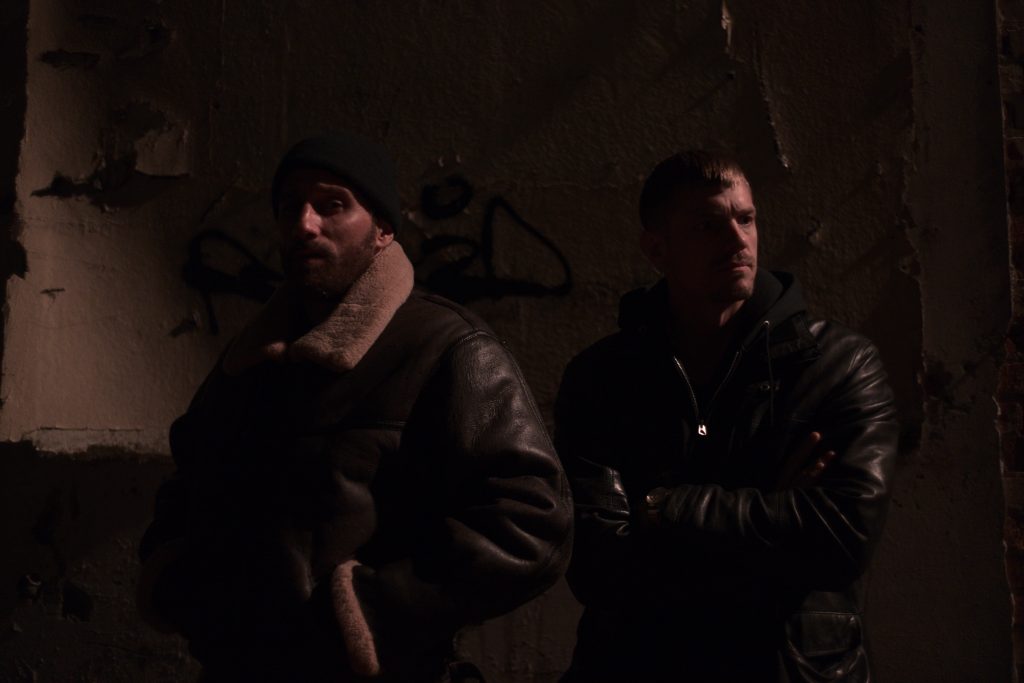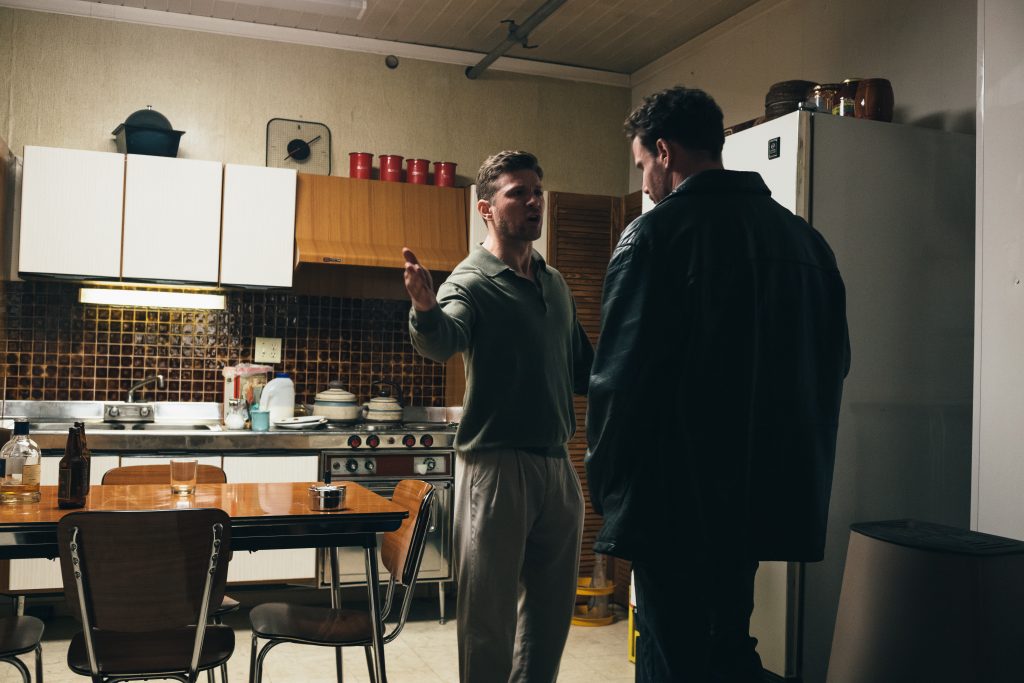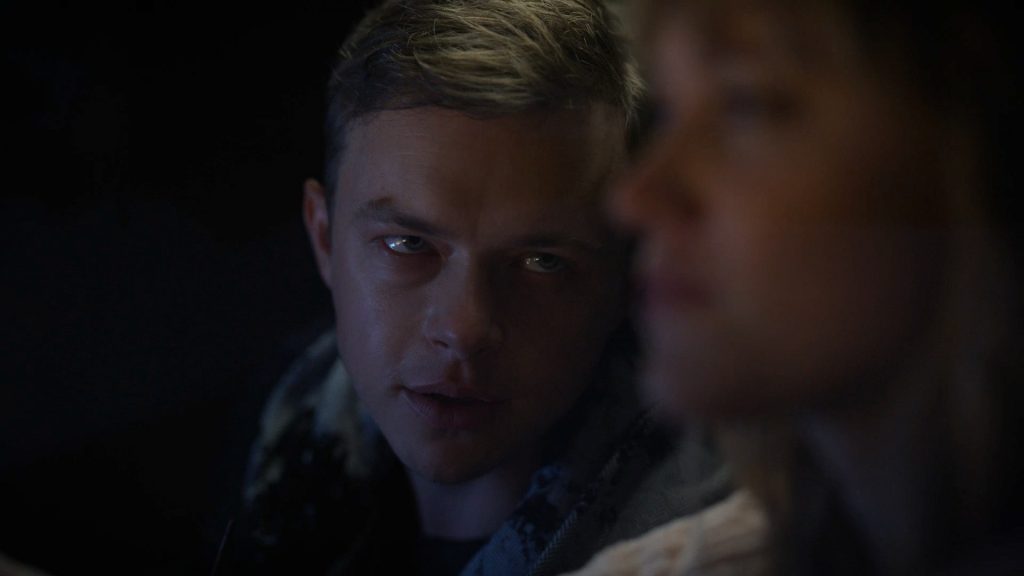July 9, 2024
by Carla Hay

Directed by Osgood Perkins
Culture Representation: Taking place in Oregon in the 1990s, the horror film “Longlegs” features a predominantly white cast of characters (with some African Americans and one Asian person) representing the working-class and middle-class.
Culture Clash: FBI agent Lee Harker is on the hunt for a serial killer who calls himself Longlegs and who has a connection to her past that haunts her.
Culture Audience: “Longlegs” will appeal primarily to people who are fans of the movie’s headliners and horror movies about trying to capture serial killers.

The horror mystery film “Longlegs” sometimes drags with slow pacing and repetitive scenarios, but the movie has a mostly gripping buildup that leads to a knockout ending. Nicolas Cage gives one of the creepiest and weirdest performances of his career. And that’s saying a lot, considering that Cage has been playing creepy and weird characters in many of his recent movies.
Written and directed by Osgood Perkins, “Longlegs” takes place in Oregon in the 1990s, wth flashbacks to the 1970s. (The movie was actually filmed in Vancouver.) “Longlegs” had its world premiere at the 2024 edition of Beyond Fest. The movie’s opening scene—which takes place somewhere in Oregon, during the winter season in 1974—shows who the title character is: He’s a serial killer who calls himself Longlegs (played by Cage), and he has evaded capture since he was first known to be a serial killer in the 1960s.
In the movie’s first scene, there’s snow on the ground, and Longlegs (who has long, stringy hair and a high-pitched voice) is seen talking to an adolescent girl (played by Lauren Acala) outside of her home. She’s about 12 or 13 years old. Longlegs’ face is only partially shown. He is babbling at her, saying nonsensical things such as, “It seems as if I wore my long legs for you.” He also reaches his hands out to her before the scene abruptly ends.
It’s eventually revealed that this girl has grown up to be FBI agent Lee Harker (played by Maika Monroe), who is on the FBI’s case to find and capture Longlegs. This elusive serial killer has a pattern: He sends letters to law enforcement taking credit for a massacre in which a father has killed his family members and then himself in the family home. The father usually does not have a history of violence, so these massacres are extremely shocking to the communities where the killings take place.
One of the main things that these massacres have in common is that there is a daughter in the family whose birthday is on the 14th of the month. Each massacre also takes place on the daughter’s birthday. He sends letters in coded symbols. (It’s a tactic that’s similar to what California’s real-like Zodiac Killer did.) “Longlegs” spends quite a bit of time on Lee trying to crack this code. Longlegs is also open about having occult beliefs and being a satanist.
Lee is as a stoic workaholic who is a loner. Her bottled-up persona masks a lot of childhood turmoil. Lee was raised by a single mother named Ruth Harker (played by Alicia Witt), who is very religious and is overly protective of Lee. (Lee’s father is not seen or mentioned in the movie.) Several scenes in the movie show Lee and Ruth having phone conversations that indicate their relationship is very complicated.
The FBI colleagues whom Lee works with the most are her supervisor Agent Carter (played by Blair Underwood) and Agent Browning (played by Michelle Choi-Lee), who is more experienced than Lee. Agent Browning is somewhat condescending to Lee and doubts that Lee has what it takes to solve this case, even though Lee shows signs that she has an uncanny intuition that might be a psychic ability. A few scenes in the movie show Agent Browning clashing with Lee.
Agent Carter can be demanding but he sees himself as Lee’s caring mentor. At one point, Agent Carter invites Lee into his home and introduces her to his wife Anna (played by Carmel Amit) and their daughter Ruby Carter (played by Ava Kelders), who is very curious about Lee’s FBI work. It takes a while for Lee to warm up to Ruby because Lee seems to be uncomfortable with children.
“Longlegs” also features the only known survivor of this serial killer Carrie Anne Camera (played by Kiernan Shipka), who is in a psychiatric facility. The movie has flashbacks to Carrie Anne (played by Maila Hosie) as a child when she encountered Longlegs. Naturally, Lee and her FBI colleagues think that Carrie Anne has vital clues that could lead to the capture of Longlegs. All of “Longlegs” cast members give serviceable performances in this movie, except for Cage who goes all-in (and sometimes overboard) in depicting this very disturbed serial killer.
“Longlegs” does not show this serial killer as much as the movie’s title might suggest. His entire face isn’t revealed until about halfway through the movie. There are scenes that show that Longlegs is a big fan of T. Rex. Some of the lyrics from “Bang a Gong (Get It On)” are shown in the beginning of the movie, and the song is played during the film’s end credits. In a scene where Longlegs is driving by himself, he is listening to T. Rex’s “Planet Queen” in his car. And at Longlegs’ home, there’s a photo of T. Rex lead singer Marc Bolan hanging on Longlegs’ bedroom wall.
One of the movie’s biggest flaws is how it shows that Longlegs (his real name is eventually revealed) has been a well-known weirdo in the communities where he’s lived. There’s a scene where he walks into a convenience store and does his usual bizarre rambling. His physical appearance is also unsettling.
The teenage clerk (played by Bea Perkins) who’s at the cash register knows who he is and seems slightly alarmed but she also doesn’t seem surprised that he’s acting this way. It seems hard to believe that this creep hasn’t been on law enforcement’s radar sooner because he would stand out as a likely suspect by people in the community who would tell law enforcement about him. He’s not the type of serial killer who easily “blends in” anywhere.
Just like writer/director Perkins did for his 2020 horror film “Gretel & Hansel,” he bathes “Longlegs” in lighting that’s filled with brown and dark gold. (Andres Arochi is the cinematographer for “Longlegs.” Galo Olivares is the cinematographer for “Gretel & Hansel.”) There are just a few atmospheric scenes in “Longlegs” that don’t further the story very well. However, the storytelling in “Longlegs” is a marked improvement over the frequently incoherent “Gretel & Hansel.”
“Longlegs” does a very good job at keeping viewers intrigued about who Longlegs really is and the motives for his crimes. The revelations aren’t always predictable. The death scenes in the movie are quite gory and bloody, but not excessive. What sets “Longlegs” apart from many other “serial killer on the loose” horror movies is how it takes the story to an unexpected and twisted revelation that won’t soon be forgotten.
Neon will release “Longlegs” in U.S. cinemas on July 12, 2024.



